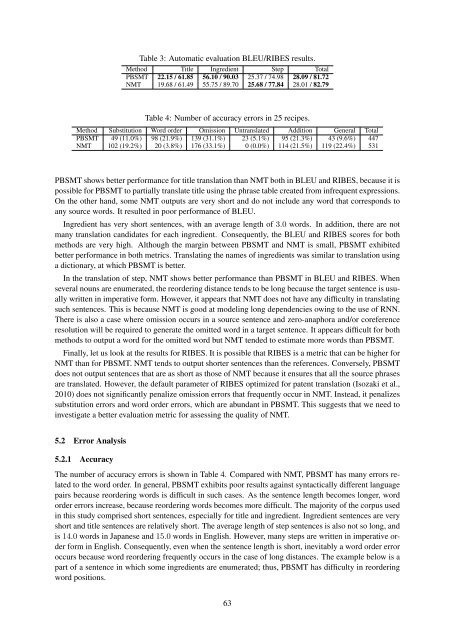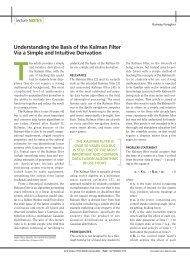December 11-16 2016 Osaka Japan
W16-46
W16-46
You also want an ePaper? Increase the reach of your titles
YUMPU automatically turns print PDFs into web optimized ePapers that Google loves.
Table 3: Automatic evaluation BLEU/RIBES results.<br />
Method Title Ingredient Step Total<br />
PBSMT 22.15 / 61.85 56.10 / 90.03 25.37 / 74.98 28.09 / 81.72<br />
NMT 19.68 / 61.49 55.75 / 89.70 25.68 / 77.84 28.01 / 82.79<br />
Table 4: Number of accuracy errors in 25 recipes.<br />
Method Substitution Word order Omission Untranslated Addition General Total<br />
PBSMT 49 (<strong>11</strong>.0%) 98 (21.9%) 139 (31.1%) 23 (5.1%) 95 (21.3%) 43 (9.6%) 447<br />
NMT 102 (19.2%) 20 (3.8%) 176 (33.1%) 0 (0.0%) <strong>11</strong>4 (21.5%) <strong>11</strong>9 (22.4%) 531<br />
PBSMT shows better performance for title translation than NMT both in BLEU and RIBES, because it is<br />
possible for PBSMT to partially translate title using the phrase table created from infrequent expressions.<br />
On the other hand, some NMT outputs are very short and do not include any word that corresponds to<br />
any source words. It resulted in poor performance of BLEU.<br />
Ingredient has very short sentences, with an average length of 3.0 words. In addition, there are not<br />
many translation candidates for each ingredient. Consequently, the BLEU and RIBES scores for both<br />
methods are very high. Although the margin between PBSMT and NMT is small, PBSMT exhibited<br />
better performance in both metrics. Translating the names of ingredients was similar to translation using<br />
a dictionary, at which PBSMT is better.<br />
In the translation of step, NMT shows better performance than PBSMT in BLEU and RIBES. When<br />
several nouns are enumerated, the reordering distance tends to be long because the target sentence is usually<br />
written in imperative form. However, it appears that NMT does not have any difficulty in translating<br />
such sentences. This is because NMT is good at modeling long dependencies owing to the use of RNN.<br />
There is also a case where omission occurs in a source sentence and zero-anaphora and/or coreference<br />
resolution will be required to generate the omitted word in a target sentence. It appears difficult for both<br />
methods to output a word for the omitted word but NMT tended to estimate more words than PBSMT.<br />
Finally, let us look at the results for RIBES. It is possible that RIBES is a metric that can be higher for<br />
NMT than for PBSMT. NMT tends to output shorter sentences than the references. Conversely, PBSMT<br />
does not output sentences that are as short as those of NMT because it ensures that all the source phrases<br />
are translated. However, the default parameter of RIBES optimized for patent translation (Isozaki et al.,<br />
2010) does not significantly penalize omission errors that frequently occur in NMT. Instead, it penalizes<br />
substitution errors and word order errors, which are abundant in PBSMT. This suggests that we need to<br />
investigate a better evaluation metric for assessing the quality of NMT.<br />
5.2 Error Analysis<br />
5.2.1 Accuracy<br />
The number of accuracy errors is shown in Table 4. Compared with NMT, PBSMT has many errors related<br />
to the word order. In general, PBSMT exhibits poor results against syntactically different language<br />
pairs because reordering words is difficult in such cases. As the sentence length becomes longer, word<br />
order errors increase, because reordering words becomes more difficult. The majority of the corpus used<br />
in this study comprised short sentences, especially for title and ingredient. Ingredient sentences are very<br />
short and title sentences are relatively short. The average length of step sentences is also not so long, and<br />
is 14.0 words in <strong>Japan</strong>ese and 15.0 words in English. However, many steps are written in imperative order<br />
form in English. Consequently, even when the sentence length is short, inevitably a word order error<br />
occurs because word reordering frequently occurs in the case of long distances. The example below is a<br />
part of a sentence in which some ingredients are enumerated; thus, PBSMT has difficulty in reordering<br />
word positions.<br />
63



